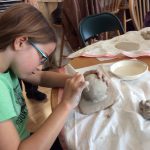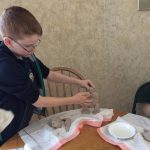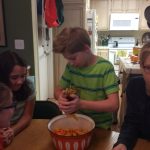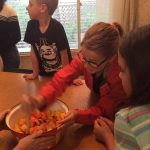This Sunday our culture school students created art in the style of Marc Chagall. They learned about the Jewish folklore in his images.
Author: trivalleyculturaljews
Lag B’Omer Picnic

Tri-Valley Cultural Jews will be hosting our annual Lag B’Omer picnic potluck on Saturday, May 13 from 10:30 – 12:30. This event will take place at Athan Downs Park, which is at 2975 Montevideo Dr. in San Ramon. Please bring: a picnic dish to share, an outdoor toy (frisbee, ball, etc.), and be ready to participate in our fun and hilarious annual watermelon toss.
Passover Seder

Tri-Valley Cultural Jews will hold our annual Community Potluck Seder on Saturday April 15, from 5:00 pm – 7:30 pm. The seder will take place at the Bothwell Arts Center, which is located at 2466 8th St. in Livermore. Our kid-friendly (but not kid-centered) haggadah is secular and progressive with lots of singing. After the hour-long ceremony, we will share a potluck dinner. Please call Leah at 650-223-9073 to let us know you are coming and what you’d like to bring for the potluck. Vegetarian dishes are encouraged but not required. Invite a friend, too! We need to hear from you by April 11 so we can be sure to have enough eggs, charoset, celery, and wine. The suggested donation for non-member adults is $20 (and you can apply this towards membership). Kids and members are free. We are participating in a book drive to benefit the Jewish Coalition for Literacy. Please bring new or gently used books for ages 4-9 to donate if you are able. Thank you!
Tri-Valley Cultural Jews Purim Celebration

Tri-Valley Cultural Jews will be holding a secular Purim celebration on Sunday, March 12 from 10:30 – 12:30 at the Bothwell Arts Center in Livermore. We will make hamantaschen, have crafts, games, and fun for all ages, and present our annual Purim skit. Attendees are welcome to come dressed as their favorite Purim character. This event is free for TVCJ members, and costs $10 for non-members (which can be applied to a membership if someone wishes to join). The Bothwell Arts center is located at 2466 8th St. in Livermore.
Our official statement on Syrian refugees
As Jews, we know all too well the suffering of war, oppression and hatred. Our people have been refugees over and over, in every time and place. We know what happens when refugees are refused admittance to safe countries, as happened to our people in the 1930s and 1940s, when xenophobia, fear and hatred denied European Jews safe haven.
Today’s refugees are Syrians, almost half a million of whom are displaced from their homes, terrorized by their own government, and victims of internecine hatred. Thousands have been waiting in miserable refugee camps while they have been vetted for up to two years by the American government. Those refugees have already been deemed safe to admit to America.
We call on the American government to admit Syrian refugees. We call on the American people to welcome them.
Tri-Valley Cultural Jews. Member community of the Congress of Secular Jewish Organizations.
JCS activity
Today the older Jewish Culture School students focused on images of the Jews in the art of the Middle Ages in Europe as a way to talk about stereotypes and propaganda that reinforces them. The students saw pictures of Jews with large hooked noses and ugly expressions meeting with Jesus, who looks like a white European, although he should have looked like a Jew. The students learned how stereotypes are used to divide people and discussed current events with this in mind. Then they made their own art depicting Jews. Of course, all of them are different!
The younger class talked about some famous Jews namely, Emma Lazarus and Albert Einstein and what it means to be part of the larger Jewish family that includes them.
Hike Shell Ridge at Walnut Creek Open Space
 Saturday, January 28th. 10:00 – 12:00. We will leave by 10:15 am. If you are running late, please call Leah at 650-223-9073.
Saturday, January 28th. 10:00 – 12:00. We will leave by 10:15 am. If you are running late, please call Leah at 650-223-9073.
Dogs are welcome on leash. We will hike for approximately 3 miles. Moderate hike with some climbs, passing by several ponds. We will make a nice loop, starting out on Fossil Hill Loop. It’s called Fossil Hill for a good reason – everything you see was once under the sea!! Watch out for rocks with seashells still attached.
Directions:
Take I-680 N
Take exit 44, Rudgear Rd.
Turn right onto Rudgear Rd
Turn left onto San Miguel Dr
Turn right onto Mountain View Blvd
Turn left onto Bales Dr
Turn left onto Walnut Blvd
Turn right onto Sutherland Dr
Park in the parking lot at the end of Sutherland.
TVCJ Hanukkah Celebration

Join the Tri-Valley Cultural Jews on Friday, December 30 from 6:00 – 8:00pm for an evening of Latkes, Light, Music and yummy food. Our celebration this year will be at the Pepper home, 6448 Owl Way in Livermore. Bring your menorah, and gather as we light our candles together, sing traditional holiday songs, and eat the freshly fried latkes pouring from the kitchen. We blend traditional celebrations with new. This year, we are partnering with the Jewish Coalition for Literacy and are asking guests to bring either new or used (in excellent condition) children’s books for their book drive. They are collecting books for children aged 4-9 (grades pre K – 3rd grade). Free tickets available at https://goo.gl/Ti4i6O. RSVP to Amy at catandchickens@gmail.com.
Family Havdalah and Game Night

Jewish Culture School
Our students made two pots of tsimmis using different ingredients. Stidents discovered the concept of “too much of a good thing” when they added a LOT of honey to one pot!










